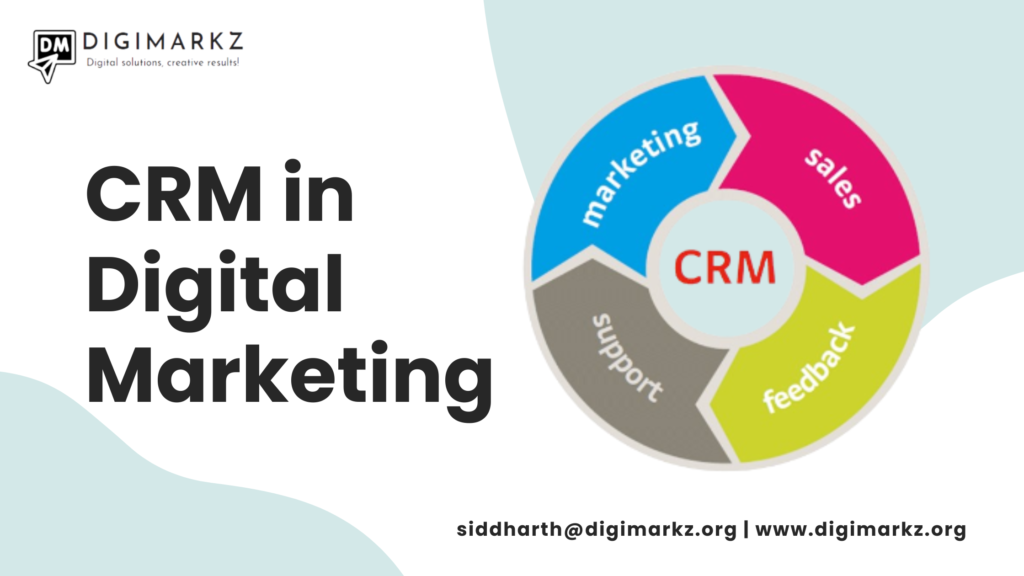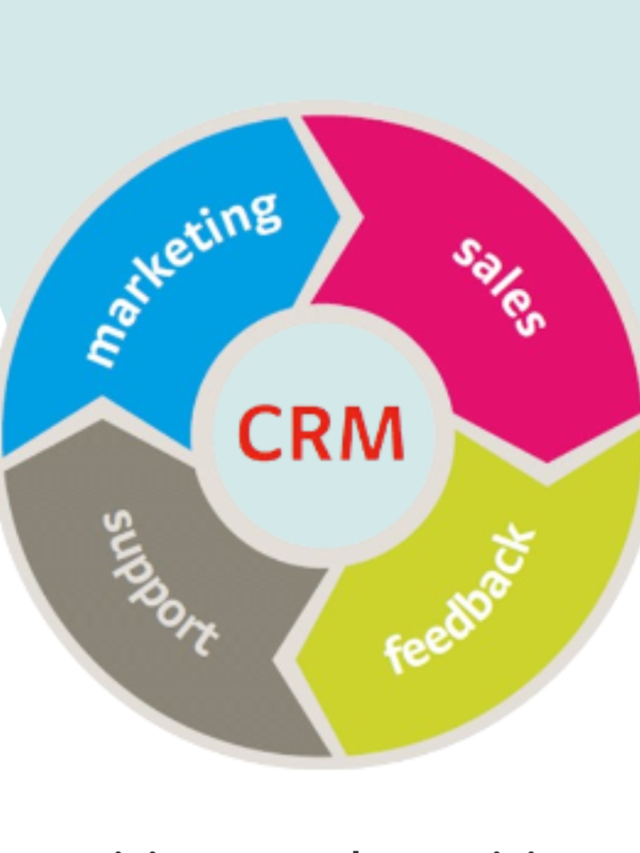In the dynamic landscape of digital marketing, staying ahead requires businesses to adopt cutting-edge technologies. One such powerhouse is Customer Relationship Management (CRM). As we embark on this journey, let’s unravel the significance of CRM in digital marketing.
Brief Overview of Digital Marketing
Digital marketing has become the cornerstone of modern business strategies, encompassing various channels like social media, email, and search engines to connect with a global audience. However, the key to success lies not just in reaching out but in building lasting relationships with customers.
Importance of Customer Relationship Management (CRM) in Digital Marketing
Enter CRM, a strategic approach that goes beyond traditional marketing by focusing on cultivating and maintaining customer relationships. It’s not just a tool but a philosophy that businesses adopt to enhance customer satisfaction and drive growth.
In this article, as a Top Digital Marketing Agency we aims to delve into the core of CRM in digital marketing, exploring its definition, evolution, benefits, integration strategies, popular tools, implementation best practices, real-world examples, challenges, and future trends.
Understanding CRM in Digital Marketing
CRM, at its essence, is a technology-driven strategy for managing a company’s interactions with current and future customers. It involves using data analysis about customers’ history with a company to improve business relationships, specifically focusing on customer retention and ultimately driving sales growth.
Evolution of CRM in the Digital Era
In the digital era, CRM has evolved from a basic database management tool to a sophisticated, data-driven system. It has adapted to the changing needs of businesses, integrating seamlessly with digital marketing strategies to provide a holistic view of customer interactions.
Core Components of CRM in Digital Marketing
CRM in digital marketing comprises various components, including customer data management, interaction tracking, lead management, email marketing, and analytics. These components work in tandem to create a unified approach to customer relationships.
Key Benefits of Using CRM in Digital Marketing
A. Improved Customer Engagement
CRM allows businesses to understand their customers on a deeper level. By analyzing customer behavior and preferences, companies can tailor their communication and engagement strategies, fostering stronger connections.
B. Enhanced Customer Retention
Retaining existing customers is often more cost-effective than acquiring new ones. CRM aids in identifying loyal customers, allowing businesses to implement personalized retention strategies and loyalty programs.
C. Personalized Marketing Campaigns
With CRM, digital marketing becomes highly targeted. Businesses can create personalized campaigns based on customer preferences, increasing the effectiveness of marketing efforts and driving better conversion rates.
D. Streamlined Communication and Collaboration
CRM systems centralize customer data, facilitating seamless communication and collaboration among different departments. This ensures everyone in the organization is on the same page when it comes to customer interactions.
E. Data-Driven Decision Making
In the digital age, data is king. CRM empowers businesses to make informed decisions by providing valuable insights into customer behavior, market trends, and the effectiveness of marketing strategies.
How CRM Integrates with Digital Marketing Strategies
A. Email Marketing Automation
CRM enhances email marketing by automating processes such as lead nurturing, segmentation, and personalized content delivery. This not only saves time but also ensures that the right message reaches the right audience.
B. Social Media Management
Integrating CRM with social media platforms enables businesses to monitor and engage with customers across various channels. It helps in creating a cohesive social media strategy aligned with broader business goals.
C. Content Personalization
By leveraging CRM data, businesses can deliver personalized content experiences. Whether it’s a blog post, email, or social media update, content tailored to individual preferences enhances engagement and builds brand loyalty.
D. Customer Segmentation
CRM allows businesses to segment their customer base based on demographics, behavior, and other criteria. This segmentation is invaluable for creating targeted marketing campaigns that resonate with specific audience segments.
E. Analytics and Reporting
The integration of CRM and analytics tools provides a comprehensive view of marketing performance. Businesses can track key metrics, measure campaign effectiveness, and refine strategies based on real-time data.
Popular CRM Tools for Digital Marketing
A. Salesforce
Salesforce stands out as a leading CRM platform, offering a range of features for marketing, sales, and customer service. Its cloud-based solution provides a centralized hub for managing customer interactions.
B. HubSpot
HubSpot is renowned for its inbound marketing tools and CRM integration. It simplifies marketing automation, lead nurturing, and customer communication, making it a favorite among small and medium-sized businesses.
C. Zoho CRM
Zoho CRM offers a user-friendly interface and a suite of tools for managing customer relationships. It caters to businesses of all sizes, providing customization options to adapt to unique marketing requirements.
D. Pipedrive
Pipedrive focuses on sales pipeline management but seamlessly integrates with marketing efforts. Its visual interface and automation features simplify lead management and conversion tracking.
E. Comparisons and Features
Choosing the right CRM tool depends on the specific needs of a business. A detailed comparison of features, pricing, and user reviews can help in making an informed decision.
| CRM Tool | Key Features | Pricing Model | User Reviews |
| Salesforce | – Robust customer data management | – Subscription-based | – Positive: Powerful features and customization options |
| – Advanced analytics and reporting | – Tiered pricing plans | – Negative: Steeper learning curve for beginners | |
| – Automation of sales and marketing processes | – Custom pricing for enterprises | ||
| HubSpot | – Inbound marketing tools and lead nurturing | – Free plan available | – Positive: User-friendly interface and integration |
| – Email marketing automation | – Starter, Professional, Enterprise | – Negative: Advanced features limited in free plan | |
| – Social media management | – Additional charges for add-ons | ||
| Zoho CRM | – User-friendly interface | – Free plan available | – Positive: Affordable pricing and scalability |
| – Automation of sales processes | – Standard, Professional, Enterprise | – Negative: Limited advanced features in free plan | |
| – Customization options | – Pay-as-you-go for add-ons | ||
| Pipedrive | – Visual sales pipeline management | – Essential, Advanced, Professional | – Positive: Intuitive design and ease of use |
| – Email integration and tracking | – Custom pricing for enterprises | – Negative: Some users find reporting features lacking | |
| – Sales forecasting | – 14-day free trial |
Implementing CRM: Best Practices
A. Assessing Business Needs
Before implementing CRM, businesses must assess their unique requirements. This involves understanding current processes, identifying pain points, and defining the desired outcomes of CRM implementation.
B. Choosing the Right CRM Solution
The market offers a plethora of CRM solutions, each catering to different business sizes and industries. The selection process should align with the business’s goals and budget.
C. Integration with Existing Systems
Seamless integration with existing systems is crucial for the success of CRM implementation. It ensures a smooth transition and minimizes disruptions in day-to-day operations.
D. Training and Onboarding
Proper training is essential to maximize the benefits of CRM. Ensuring that team members are well-versed in using the CRM system guarantees optimal utilization and prevents potential roadblocks.
Overcoming Challenges in CRM Implementation
A. Data Security and Privacy Concerns
One of the primary concerns in CRM implementation is ensuring the security and privacy of customer data. Businesses must adopt robust security measures and comply with relevant regulations to build trust with customers.
B. Resistance to Change
Employees may resist the adoption of new technologies. To overcome this challenge, businesses should communicate the benefits of CRM, provide comprehensive training, and involve employees in the decision-making process.
C. Integration Challenges
Integrating CRM with existing systems can be complex. Businesses should work closely with their IT teams or consultants to ensure a smooth integration process and minimize disruptions.
D. Continuous Monitoring and Optimization
CRM implementation is an ongoing process that requires continuous monitoring and optimization. Regularly reviewing processes and making necessary adjustments ensures that the CRM system aligns with evolving business needs.
Future Trends in CRM and Digital Marketing
A. Artificial Intelligence in CRM
The integration of artificial intelligence (AI) in CRM is poised to revolutionize customer interactions. AI-driven insights, chatbots, and predictive analytics will enhance the efficiency and personalization of CRM systems.
B. Predictive Analytics
Predictive analytics will play a crucial role in anticipating customer behavior and trends. Businesses can proactively adjust their marketing strategies based on predictive insights, staying ahead of the competition.
C. Omni-Channel Customer Experience
The future of CRM lies in providing a seamless omni-channel customer experience. Integrating CRM across various touchpoints ensures a cohesive and personalized journey for customers, irrespective of the channel they choose.
Conclusion
As we conclude our exploration of CRM in digital marketing, it’s evident that CRM is not just a tool; it’s a strategic approach that empowers businesses to build meaningful, long-lasting relationships with their customers.
For businesses looking to thrive in the digital age, embracing CRM is not an option—it’s a necessity. The insights gained, the efficiencies unlocked, and the personalized experiences delivered can propel your business toward unprecedented growth.


